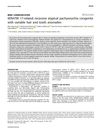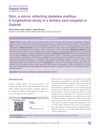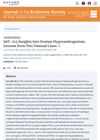3 citations,
February 2002 in “The American journal of psychiatry” Stopping birth control pills may have triggered a manic episode in a woman with HAIR-AN syndrome.
 76 citations,
January 2007 in “American Journal of Clinical Dermatology”
76 citations,
January 2007 in “American Journal of Clinical Dermatology” Women with PCOS often have skin problems like excessive hair, acne, hair loss, and dark patches, which can be treated with hormonal and non-hormonal therapies.
 3 citations,
June 2022 in “European journal of human genetics”
3 citations,
June 2022 in “European journal of human genetics” A new type of pachyonychia congenita linked to a specific keratin gene mutation was found in two Pakistani families.
 January 1987 in “Journal of steroid biochemistry/Journal of Steroid Biochemistry”
January 1987 in “Journal of steroid biochemistry/Journal of Steroid Biochemistry” Norethisterone (jenapharm) therapy is effective for endometrial cancer.
 16 citations,
March 2014 in “Journal of the European Academy of Dermatology and Venereology”
16 citations,
March 2014 in “Journal of the European Academy of Dermatology and Venereology” Korean patients with PCOS often have skin problems like acne and excess hair, with different symptoms based on their specific PCOS type.
 30 citations,
January 2013 in “Obesity Surgery”
30 citations,
January 2013 in “Obesity Surgery” Bariatric surgery affects skin health, causing both direct complications and changes in existing skin conditions, often related to nutritional deficiencies.
 22 citations,
January 2013 in “International Journal of Trichology”
22 citations,
January 2013 in “International Journal of Trichology” Hair loss is often linked to thyroid problems, especially in women and older people, and screening for thyroid issues is advised for those with hair loss.
 11 citations,
January 2013 in “Indian Journal of Endocrinology and Metabolism”
11 citations,
January 2013 in “Indian Journal of Endocrinology and Metabolism” Skin problems are common in people with diabetes and controlling blood sugar can reduce these issues.
 50 citations,
January 2013 in “Indian Journal of Dermatology”
50 citations,
January 2013 in “Indian Journal of Dermatology” Some skin conditions, like psoriasis and early-onset baldness, may indicate metabolic syndrome, and others are linked to diabetes risk and cardiovascular issues.
11 citations,
July 2019 in “International journal of women’s dermatology” Certain skin conditions in women are linked to higher risks of metabolic syndrome and type 2 diabetes due to hormone imbalances.
17 citations,
July 1984 in “British journal of dermatology/British journal of dermatology, Supplement” The four patients have a unique type of ichthyosis affecting hair follicles.
 1 citations,
November 2015 in “European medical journal”
1 citations,
November 2015 in “European medical journal” Acne is common and can be linked to various systemic health conditions and syndromes.
April 2018 in “African journal of rheumatology” A Nigerian teenager was diagnosed with neuropsychiatric lupus, showing various severe symptoms and abnormal lab results.
 2 citations,
September 2014 in “Journal of evolution of medical and dental sciences”
2 citations,
September 2014 in “Journal of evolution of medical and dental sciences” Evaluating various physical and health factors helps diagnose polycystic ovarian syndrome (PCOS).
 November 2024 in “IP Indian Journal of Clinical and Experimental Dermatology”
November 2024 in “IP Indian Journal of Clinical and Experimental Dermatology” Certain skin conditions can indicate a higher risk of diabetes and heart problems.
 4 citations,
January 2019 in “PubMed”
4 citations,
January 2019 in “PubMed” Patterned hair loss in women is linked to hormonal imbalances and biochemical changes, and should be evaluated for underlying health issues.
 97 citations,
July 2006 in “Dermatologic therapy”
97 citations,
July 2006 in “Dermatologic therapy” The document concludes that accurate diagnosis and personalized treatment are important for skin problems in women with PCOS.
 2 citations,
June 2017 in “Journal of The American Academy of Dermatology”
2 citations,
June 2017 in “Journal of The American Academy of Dermatology” The type of PCOS a woman has doesn't strongly predict her skin or metabolic symptoms; obesity is a more important factor.
 April 2016 in “Journal of The American Academy of Dermatology”
April 2016 in “Journal of The American Academy of Dermatology” Hirsutism and acanthosis nigricans are reliable skin signs of PCOS linked to metabolic issues, while acne is not a reliable marker of the condition.
 April 2016 in “Journal of The American Academy of Dermatology”
April 2016 in “Journal of The American Academy of Dermatology” Women with PCOS often have more hair growth, skin darkening, and acne, which are linked to hormonal and metabolic issues.
 July 2015 in “NEJM Journal Watch”
July 2015 in “NEJM Journal Watch” Diagnosing and treating PCOS in young people is difficult.
 December 2023 in “PubMed”
December 2023 in “PubMed” Metformin and liraglutide improved symptoms of HAIR-AN syndrome in a child.
31 citations,
May 2013 in “Clinical Cosmetic and Investigational Dermatology” Proper skin care and dermocosmetics improve skin issues in diabetes patients.
 May 2002 in “British Journal of Dermatology”
May 2002 in “British Journal of Dermatology” A pregnant woman's skin condition improved after giving birth, possibly due to high estrogen levels during pregnancy.
 September 2022 in “Indian journal of research in homeopathy/Indian journal of research in homoeopathy”
September 2022 in “Indian journal of research in homeopathy/Indian journal of research in homoeopathy” Homeopathic treatment improved symptoms of PCOS in seven patients.
 March 2024 in “International journal of life-sciences scientific research/SSR Institute of International Journal of Life Sciences”
March 2024 in “International journal of life-sciences scientific research/SSR Institute of International Journal of Life Sciences” PCOS has many symptoms, with high androgen levels being the most common.
 26 citations,
January 2000 in “Hormone research in paediatrics”
26 citations,
January 2000 in “Hormone research in paediatrics” Insulin resistance is linked to high male hormone levels in women, often seen in those with PCOS.
 October 2023 in “Journal of the Endocrine Society”
October 2023 in “Journal of the Endocrine Society” Hormonal therapy in adults with gender dysphoria often leads to skin issues like acne, requiring a team of skin and hormone doctors.
 April 2019 in “Journal of the Endocrine Society”
April 2019 in “Journal of the Endocrine Society” The study found that imaging might miss small ovarian tumors causing high testosterone, and suggested using certain testosterone levels and treatment responses to identify these tumors.
 1 citations,
December 2022 in “Gynecological Endocrinology”
1 citations,
December 2022 in “Gynecological Endocrinology” The most common skin issues in females with Polycystic Ovary Syndrome (PCOS) are excessive hair growth, hair loss, oily skin, acne, dark skin patches, and skin tags, which may be linked to hormone and insulin levels.
























